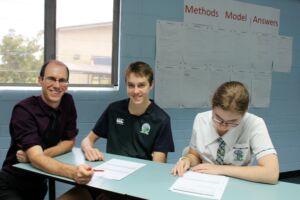Queensland independent school mathematics teacher Nick Brooking has earned the praise of students and parents for his unique techniques to reduce students’ exam anxiety.
Mr Brooking (pictured below) was already aware of the positive academic impacts of reducing student stress in exams after observing it during his nine years of teaching in England, and was further inspired by a professional development session in Cairns on the topic in 2019.
So the Head of Mathematics at Peace Lutheran College in Cairns decided to trial some strategies on one of his senior classes. He then surveyed students on the effectiveness of the strategies in reducing their stress.
His approach involved four relatively basic steps:
- An in-class discussion about cortisol and its effect on the brain;
- A second presentation on brain chemistry and how to regulate cortisol, dopamine and melatonin in order to maximise academic results;
- Putting a post-it note with a message of encouragement on each students’ exam paper;
- Placing a lolly beside the note.
An immediate positive effect
The first students Mr Booking trialed the techniques on in mid-2019 – his Year 11 Mathematical Methods class (those students are now in Year 12 and facing up to their Term Four external assessment exams) – reported their anxiety had reduced from
All four techniques rated highly: placing a lolly on the desk topped the list, with an average score of 4.5 out of 5, followed by the in-class discussion of cortisol (4.21), the personal message of encouragement (4.21) and the broader presentation about brain chemistry (4.07).
Students also provided written comments which included that the activities had “reshaped” their approach to exams.
“After understanding what is happening chemically in our bodies (it) made it much easier to ignore stress and think logically,” one student wrote.
Mr Brooking said while he knew the techniques would be effective, even he was surprised by how enthusiastically they were received by the teenagers.
“I didn’t appreciate just how helpful the techniques would be,” he said “but the feedback they gave showed it made a really big difference.”
Techniques have since spread through Maths department
The pre-exam strategies were extended to a teaching colleague’s Year 11 Essential Mathematics class with very similar anecdotal feedback.
Twelve months on, anxiety-reducing activities are now being delivered throughout the college’s Mathematics department, and also include student mindset activities, power poses (striking a confident stance), and the academic-backed “spacing” technique (where previously learned concepts are revised at intervals before exams).
‘You’ve got this’
Mr Brooking, 36, said the post-it notes often feature a hand-written message of encouragement like “You’ve prepared for this: you’ve got this” or “It’s not brain freeze, it’s just cortisol, so smile”. On other occasions, he leaves a funny meme on students’ desks.
“When they come in to an exam and see what’s on their desk beside the exam papers, they smile or have a little quiet laugh and it sets them at ease and reduces that initial anxiety,” he said.
“As a result we see students are generally calmer at the start of exams and they are calmer going through it.
“Importantly, when they are coming across a question they are unsure about, instead of freezing up, they work their way through it. Then when the exam finishes, they are generally more realistic about how they have done, rather than thinking it was all a failure.”
National spotlight on Peace Lutheran
As Queensland seniors gear up for their much anticipated external assessment block in Term 4, Mr Brooking’s approach has attracted attention.
A paper he wrote about his approach was published by Teacher magazine on 15 September.
Members of the school community have also praised the approach on the school’s Facebook page.
“It’s wonderful to read how the teachers and students at Peace are collaborating to improve their well-being and educational outcomes. Fantastic work Mr Brooking!,” one person wrote.
“That’s brilliant! Well done Mr Brooking,” another said.
Mr Brooking said while he won’t be able to repeat the post-it note/lolly technique on his Grade 12 students’ Term Four examinations (due to the fact the exams are managed externally under the new QCE system) he is confident his students are in a good place due to their 12 months of practising the pre-exam techniques.
Dates and information on Queensland’s Term 4 2020 External Assessments
The Queensland Curriculum and Assessment Authority (QCAA) has released the timetable for Term 4 External Assessments as well as a list of what equipment students are allowed to take into assessments. The QCAA website also has fact sheets for students, sample papers and answers to other FAQs. External assessments will take place from 26 October until 17 November.
Freqently asked questions about ATAR are available on the Queensland Tertiary Admissions Centre website. The 2020 ATAR will be released at 9am on 19 December 2020.
More reading
Read teacher Nick Brooking’s original story in Teacher magazine.
Find out about the science-backed tips for getting exam preparation ‘right’ in our story.




